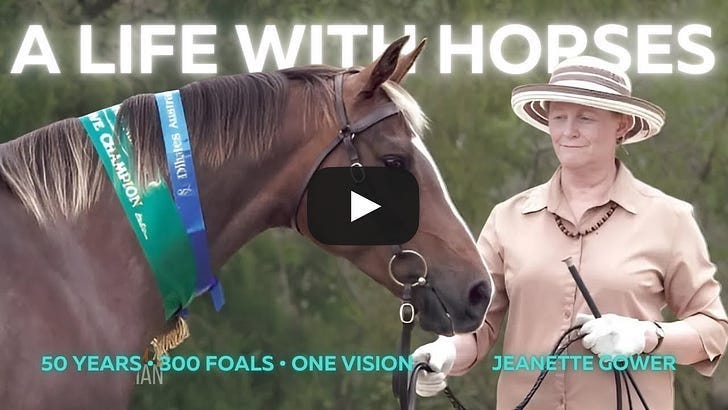I was really honoured recently to be invited to be interviewed with UK hosts Theresa and Anna-Louise from Curious Equestrian to feature as one of their guests.
I hope you like it.
This is what they said in the lead up to it:
The story of Jeanette Gower begins with a teenage girl who simply wouldn't take no for an answer. Armed with library books and an unshakeable determination, she chose to ignore the naysayers who insisted she'd never succeed at breeding horses. Five decades and over 300 foals later, her Chalani Stud demonstrates what happens when passion meets persistence.
In our latest episode, Jeanette takes us back to her first encounter with horses—being placed on a two-year-old polo pony with no prior experience. This sparked a journey that would reshape Australian horse breeding practices.
What strikes me most about Jeanette's narrative isn't just her success, but how she arrived at it. Jeanette's approach has always centred on one fundamental question: What's best for the horse?
This philosophy manifests in surprising ways. She keeps her horses in paddocks rather than stables, feeds them simply without elaborate supplements, and maintains detailed records of every foal born. She vets potential buyers and even asks about horse floats (trailers), not as a status check but to ensure emergency veterinary care is accessible.
Her stance on the "forever home" myth is particularly thought-provoking. While many sellers promise forever homes, Jeanette argues this concept does more harm than good. Life is unpredictable – illness, accidents, or financial hardship can force even the most dedicated owner to rehome their horse. Instead of clinging to this unrealistic ideal, she advocates for creating robust support networks and maintaining traceability throughout a horse's life.
Perhaps most refreshingly, Jeanette tackles the thorny issue of responsible breeding head-on. "If you can't sell horses, don't breed," she states plainly. This might seem harsh, but it cuts to the heart of a serious welfare issue. Too many horses are bred without consideration for their future, leading to neglect, abandonment, or worse.
This commitment to preservation while questioning tradition echoes through her recent Substack article "Back to basics - Preserving the Legacy of the Working Horse" (December 12, 2024). There, she tackles a fundamental challenge: how to maintain the qualities that made working horses invaluable – durability, intelligence, and sound disposition – in an era where fewer horses work full days on ranches.
"Breeding for a 'using horse' isn't just about selecting the right stallions or mares," she writes, "it's about embracing the values that guided programs like the King Ranch."
REFLECTIONS ON 50+YEARS OF HORSE BREEDING
Back to basics - Preserving the Legacy of the Working Horse
This philosophy mirrors the conversation about the evolution of breeding practices over her 50-year career, where she's consistently prioritized substance over show ring flash.
Looking ahead, Jeanette hopes her legacy will endure not just through her horses but also through the knowledge she shares. Her message is clear: successful breeding isn't about producing the most foals or the flashiest colours—it's about creating healthy, well-adjusted horses with bright futures.
As the conversation winds down, she confesses with a laugh that she's "addicted" to breeding horses. But unlike many addictions, this one has produced something remarkable – a blueprint for ethical, sustainable horse breeding that puts welfare first.
For those interested in learning more, Jeanette shares her insights through her newsletter "Thinking Horse Breeder" and her books, including the internationally acclaimed "Horse Colour Explained." Her latest e-books tackle practical aspects of horse buying and selling, continuing her mission to educate and inspire responsible horsemanship.
Latest Episode: youtube.com/@curiousequestrian
Read: curiousequestrian
Join Theresa’s subscriber chat






